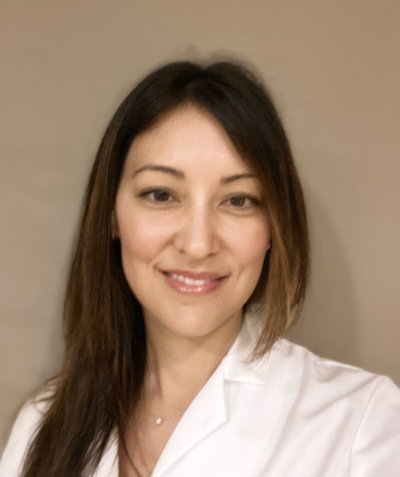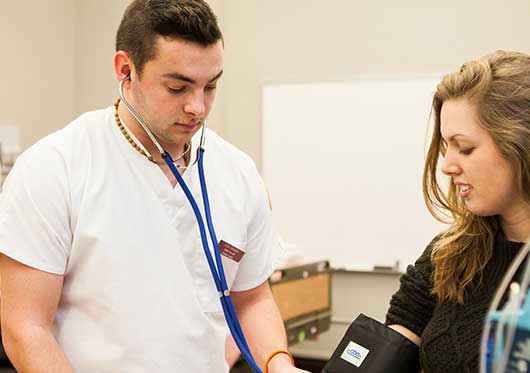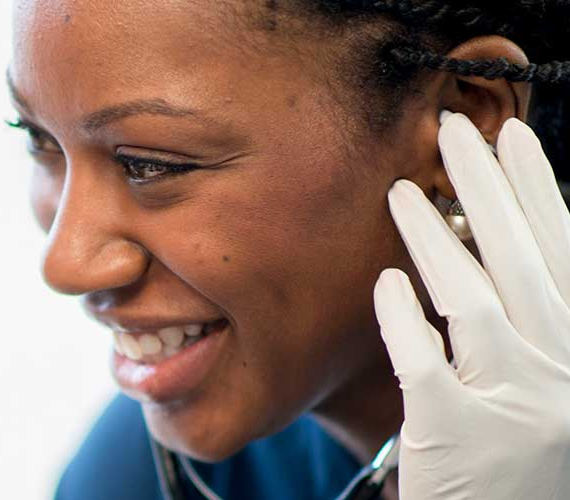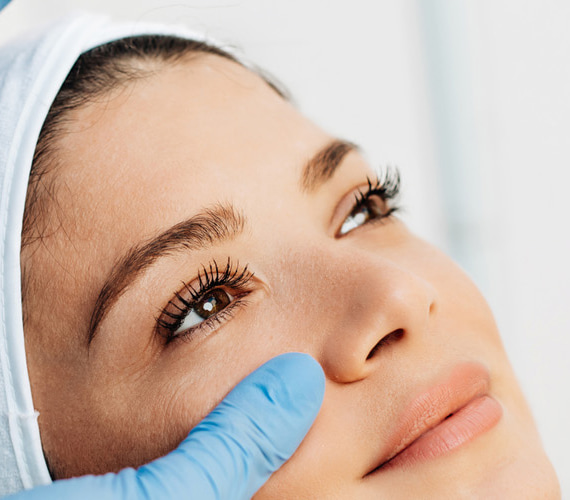Experiences with her delivery nurses led healthcare manager Sarah Kasper to the profession.
 “I never understood the true value of nurses until I became a patient,” reflects Sarah Kasper BSN ’23 who is currently enrolled in 24-Month BS in Nursing for Non-Nursing Graduates program at Regis College. “I had wonderful experiences delivering my children and I can directly attribute this to the amazing support I received from the nursing team.”
“I never understood the true value of nurses until I became a patient,” reflects Sarah Kasper BSN ’23 who is currently enrolled in 24-Month BS in Nursing for Non-Nursing Graduates program at Regis College. “I had wonderful experiences delivering my children and I can directly attribute this to the amazing support I received from the nursing team.”
While Kasper says her goal is “to deliver the same experiences to my patients,” she often finds the relationship to be reciprocal. “I am grateful for my interactions with my patients,” she adds. “I have learned so much from them - the secret to a long life (have a garden, don’t eat too much bacon), the key to a happy marriage (lots of laughter). One patient gave me advice on handling challenging relationships. A patient with a multitude of past hardships helped me understand some preconceived ideas that I held. All patients helped me practice empathy.”
Nursing was not originally a part of the plan. Kasper began her career in the health insurance industry managing employee benefit programs for various companies and onsite employer health clinics.
“While I enjoyed this work, I recognized that many healthcare decisions are made by people who do not actually deliver healthcare,” Kasper explains. “We all know that our system needs to be overhauled, but meaningful change needs to be created by people who understand the experience of treating patients.”
For all her experience and interest in healthcare reform, bedside nursing was not initially the obvious path to Kasper and those who knew her best.
“If you had asked me ten years ago where I would have seen Sarah today, in 2022, I would have answered ‘C-suite,’" says Grace Choi, who met Kasper when both were undergraduates at University of Notre Dame and has remained one of her closest friends since. “In all honesty, I was surprised when she told me she was planning on attending nursing school…the signs were there--I just hadn't seen them.”
Kasper said she realizes “that I love interacting with patients and their families. It is a privilege and a humbling responsibility to help people at a time where they are most vulnerable.” But there were practical considerations including her own family.
“If it weren’t for the asynchronous format of this program, I would not be in nursing school,” she says. “I am the mother of two young daughters, and I do not have family nearby to help with their care. This program allows me the flexibility to be present with my children while completing coursework and pursuing my personal goals.”
She was able to find clinical rotations at Care Dimensions Hospice Care and Metrowest Medical Center Natick where she lives and Framingham, the next town over, as well as the VA nearby in West Roxbury.
“When you see others at their most vulnerable - scared, weak, in pain - it gives us in healthcare the opportunity to make this situation just a little less stressful for our patients,” she says. But while she enjoys patient care, “in the long term, I would love to seek out opportunities to improve our healthcare delivery system. I do not know what this will look like, but I realize if I keep an open mind and continue to improve, I will discover a path that will align with my ultimate goal of serving others.”
Working in the health insurance industry earlier in her career gave Kasper a window on disparities and the motivation to address them. She found that quality of care varies greatly depending on geography, income, education, gender, language and race.
For example, she notes, “Employers with highly paid employees provide generous benefits with broader access to healthcare and additional health improvement opportunities. In contrast, other employers can only afford less generous coverages for their employees.
“When companies provide more generous benefits, their employees can access better care with less out of pocket costs - this leads to better health outcomes. With the less generous employers, their employees often pay more for care (and were generally paid less in general). As a result, they were more likely to avoid receiving medical care entirely due to cost.”
Addressing the big picture is down the road. For now, it’s all about completing her degree, caring for patients one at a time. In the meantime, Kasper’s example has given friends like Choi, who went on to receive a PhD in Food Studies from NYU and launch her own business, the courage to pursue their own passions.
“A little while after her second daughter was born, Sarah sent out a message to the group chat shared by our college friends where she talked about taking a little road trip with both her girls,” Choi recalls. "I practice being a little bit braver every day. Soon after, I had my first child (a girl named Kasper, after and inspired by Sarah) and felt like my life and sense of self had turned completely upside down. Each new day felt incredibly daunting and full of danger, so I'd just repeat what she said in my head: "Be a little bit braver every day." It was like a mantra, and I still go back to it when I'm faced with a new challenge or fear. Sarah has a really inspiring growth mindset and she lives and practices it in these incredibly special and actionable ways that just really connect.”
Share Sarah’s search for “asynchronous-ity?” Learn more about the 24-Month BS In Nursing for Non-Nursing Graduates (online) program.



